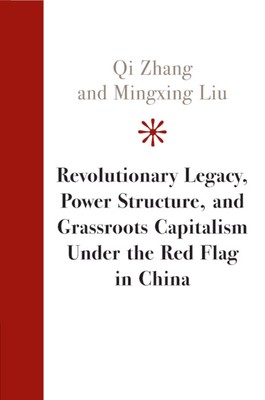
- We will send in 10–14 business days.
- Author: Qi Zhang
- Publisher: Cambridge University Press
- ISBN-10: 1108949266
- ISBN-13: 9781108949262
- Format: 15.2 x 22.9 x 1.9 cm, minkšti viršeliai
- Language: English
- SAVE -10% with code: EXTRA
Revolutionary Legacy, Power Structure, and Grassroots Capitalism Under the Red Flag in China (e-book) (used book) | bookbook.eu
Reviews
Description
Why do political elites in authoritarian regimes, even within the same country, engage in different levels of predatory behavior, whereby some foster vibrant capitalism and others suffocate the innovative private sector? This book proposes a theory of localized property-rights protection under authoritarianism. By combining in-depth fieldwork with archival research and quantitative data analysis, Qi Zhang and Mingxing Liu discuss the post-1949 conflicts between dominant and marginalized factions in the Chinese province of Zhejiang. These conflicts resulted in systemic vulnerabilities among the marginalized local cadres, thus motivating them to form alliances with their grassroots constituents. They therefore provided their constituents with quasi-public goods, such as property-rights protection, to increase their odds of political survival. Zhang and Liu argue that this framework can apply both to the Mao era and to the current reform era, and it also can be extended beyond China to a wider context.
EXTRA 10 % discount with code: EXTRA
The promotion ends in 24d.03:51:46
The discount code is valid when purchasing from 10 €. Discounts do not stack.
- Author: Qi Zhang
- Publisher: Cambridge University Press
- ISBN-10: 1108949266
- ISBN-13: 9781108949262
- Format: 15.2 x 22.9 x 1.9 cm, minkšti viršeliai
- Language: English English
Why do political elites in authoritarian regimes, even within the same country, engage in different levels of predatory behavior, whereby some foster vibrant capitalism and others suffocate the innovative private sector? This book proposes a theory of localized property-rights protection under authoritarianism. By combining in-depth fieldwork with archival research and quantitative data analysis, Qi Zhang and Mingxing Liu discuss the post-1949 conflicts between dominant and marginalized factions in the Chinese province of Zhejiang. These conflicts resulted in systemic vulnerabilities among the marginalized local cadres, thus motivating them to form alliances with their grassroots constituents. They therefore provided their constituents with quasi-public goods, such as property-rights protection, to increase their odds of political survival. Zhang and Liu argue that this framework can apply both to the Mao era and to the current reform era, and it also can be extended beyond China to a wider context.


Reviews